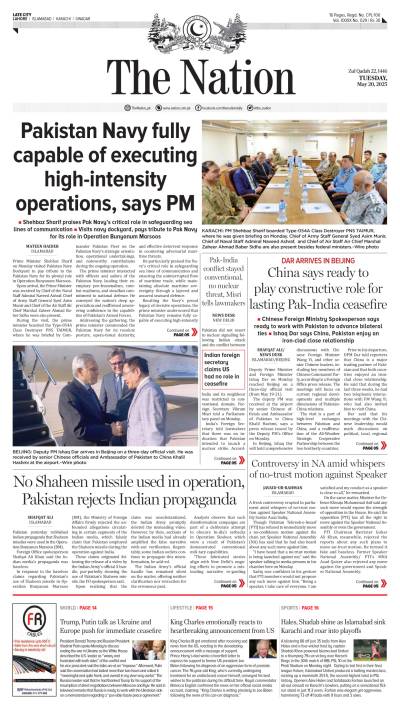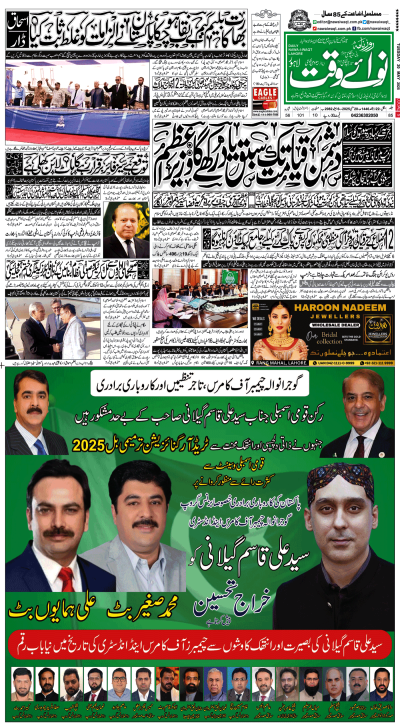Lahore - Lax attitude of authorities towards implementing child labour laws, virtually no research work by Punjab Labour and Human Right Department to find out the number of such workers and failure of the provincial government in providing free and compulsory education to the children is encouraging the scourge of child labour to grow, a research conducted by The Nation points out.
So far as the parents’ point of view is concerned, the study shows that poverty and lack of free schooling alternative is the main culprit. Interviews of parents from low income bracket who work as cooks, maids and drivers show that they force their children to work for measly wages in order to enhance the family’s income. In some cases, where the parents wanted to send their children to school but could not, they expressed their dissatisfaction over the absence of free schooling facilities.
Slums dwellers were found to be collecting garbage and recyclable items to be sold to junk dealers. Many of the garbage collectors were found to be belonging to Afghan families who had settled here more than three decades ago but are doing menial work that is barely enough to eke out an existence. The study found that commercial sector including shops, car workshops, puncture shops, and factories employ children on a large scale owing to lack of checks. Even in cases where the chance of death or a major injury is obvious like children working at gas decanting centres, it is neglected.
Jameel, who is a worker at a shoe factory, whose 12-year old son is employed at another leather tanning factory inside the walled city said that his son is better off with a job since he is earning something for the family. Jameel did not seem worried by the harmful chemicals his son had to handle in the course of the work.
Another family interviewed expressed the view that whatever work is available, it is alright because with one more family member earning bread, however young, means one less mouth to feed. Others said that work is the only option since there is no question of affording a school. In many cases, the parents did not make an effort to get their children admitted to schools thinking that fee will be unaffordable.
The study revealed that there is no data collecting work that the Punjab Labour and Human Resource Department has done over the years in order to find out the number of child workers employed in various sectors across province.
When contacted, Assistant Director Rao Zahid Muhammad said that although finding out the number of such children is not a difficult job, the department has not done any research work.
“The department does not collect data on the number of children. It mainly has been doing the legislation work on labour issues.” He said.
However, so far as its legislation role is concerned, it appears dismal since it has yet to do any legislation on the issue of domestic child workers.
“There is no law to control domestic child labours.” The official said.
He also said that the figures collected by the UNICIEF and NGOs are exaggerated as the intention is to blow the issue out of proportion.
According to UNICEF, the total number of children employed in various sectors in 2012 stood at 10 million (according to estimates 35.4 percent of Pakistan’s population is under 14). Approximately 9.8 million of these child workers are between 10-19 years age group. While research titled State of Pakistan’s Children 2013 by Society for Protection of the Rights of the Child (SPARC) puts the number at 12 million but it also calls for the need for fresh research work to collect facts and figures. SPARC, however did not collect data on its own; it has referred to the figures provided by the International Labour Organisation.
Federal Secretary Law, Justice and Human Rights Barrister Zafar Ullah Khan, while talking to The Nation admitted that the issue of child labour is linked to lack of free educational facilities to the children. He said that the constitution of Pakistan is clear on the issue that all the children between 5-16 years of age should be provided free education by the state.
He, however, said that there was a greater need to see to it the compulsory schooling of all children was enforced in letter and in spirit.
Barrister Zafar Ullah also said that the menace continues to exist because of parents themselves who encourage their children to work at an early age. He said that to end it, a concerted effort is required not only on the part of the federal government but also on the provincial level since the subject of labour has been devolved to the provinces.
He said that children working in the domestic sector were subjected to violence, torture and sexual abuse. However, he said that he had drawn up a bill on the subject and sent it to the Cabinet for approval. He was hopeful that so far the domestic sector was concerned, the passage of law will help improve the situation.
Punjab Free Education and Compulsory Bill 2013 which envisions setting up a certain number of schools for the purpose has yet to be passed from the Punjab Assembly. There are reports that the bill is in a limbo since the Punjab government is not enthusiastic to have it passed. When the Nation tried to contact Punjab Minister for Education Rana Mashood, he was not available for the comment.
Iftikhar Tarar, a lawyer who has a degree in Labour laws and is a professor at a well-known university, also is of the view that the scourge exists because of the failure of the state to provide free education at least to those who cannot afford formal schooling.
If education is made compulsory not just in theory but in practice with the government providing books, lunch and a small monthly stipend, it can entice the desperate families towards schools.
He said that child workers are still employed in carpet weaving and football factories. He explained that so far as carpet weaving industry is concerned, a substantial part of it is based inside private residential compounds and is unregistered. A number of children continues to work in football factories based in Sialkot and since these factories are operating secretly, there is neither any data nor any systematic plan to initiate action, he said. He was dismissive about the role of successive governments, saying that although the constitution of 1973 explicitly forbids forced labour, very little has been done over the years to actually stem it.
He was of the view that child labour ought to be seen as a violation of fundamental rights of children. Apart from blaming government for failing to enforce the law, the professor also blamed the media and police. “While media and police rushes when a child marriage is being performed, it fails to cover the plight of those who are of the same age but are working as labours in broad daylight.”
According to a Law Officer working with the federal government, the problem is huge but not as hard to control. He admits that the scourge exists because of the failure of the government both at the centre and the provincial level to implement the laws properly. He said that even the children working in the commercial sector have been left in the lurch although, compared to the children employed in the domestic sector (houses), they can be easily rescued.
“The government could have at least easily recued children that are working in factories and workshops who can be seen in broad daylight through awarding harsh punishment to the employers but it simply does not want to act”, he said.
Wednesday, May 21, 2025
The curse of child labour

Caption: The curse of child labour
DPM Dar, Chinese FM hails all-weather strategic cooperative partnership
8:43 PM | May 20, 2025
FIA cracks down on Gujranwala passport scam, nabs 14 agents
4:44 PM | May 20, 2025
Govt reviews monsoon preparedness amid rising flood risks
4:36 PM | May 20, 2025
Ahsan Iqbal,CM Bugti discuss development projects
4:33 PM | May 20, 2025
-
Lahore emerges among safest global cities in Numbeo 2025 index
-
Lahore emerges among safest global cities in Numbeo 2025 index
-
India’s suspension of Indus Water Treaty legally baseless
-
Seventh polio case reported in Pakistan amid nationwide vaccination drive
-
Pakistan reports sixth polio case of 2025
-
PTA begins issuing VPN licences to regulate usage
The Wider War
May 20, 2025
Margalla on Fire
May 20, 2025
Defeated and Depressed
May 20, 2025
Regional Reset
May 19, 2025
Peak Potential
May 19, 2025
Worse than Anarchy
May 20, 2025
Salute to our Air Force
May 20, 2025
An Unbreakable Wall
May 20, 2025
Profiteering Milk
May 20, 2025
Rewriting the Rules
May 20, 2025
ePaper - Nawaiwaqt
Nawaiwaqt Group | Copyright © 2025





